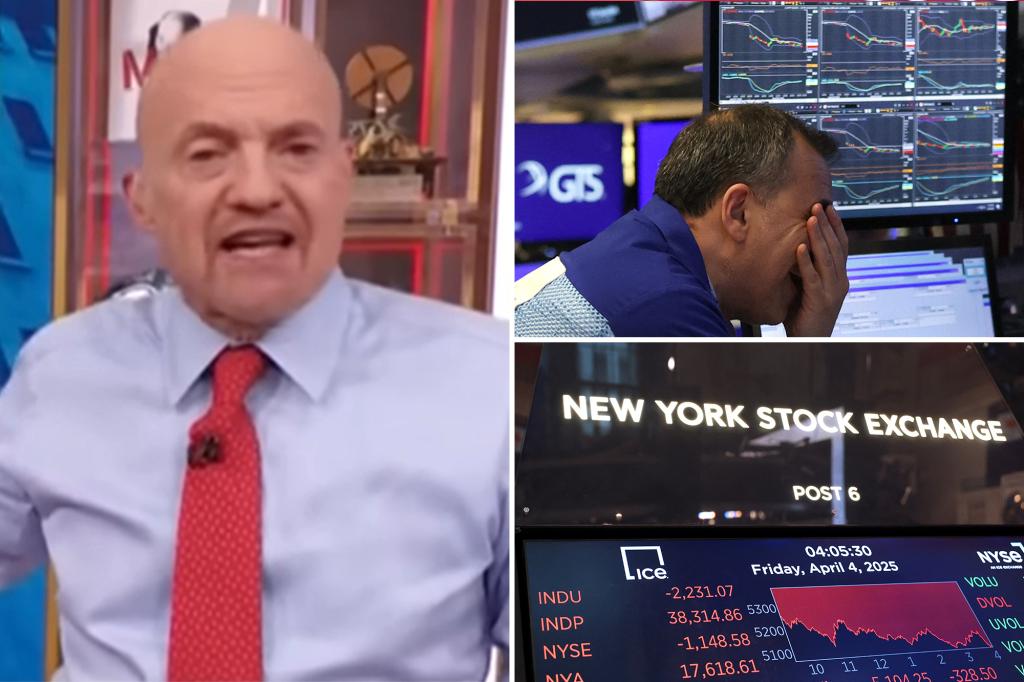Is a ‘Black Monday’ Looming? Jim Cramer Warns of Market Turmoil
CNBC’s Jim Cramer has sounded the alarm about a potential stock market crash reminiscent of 1987’s “Black Monday,” citing former President Donald Trump’s proposed tariffs as a key trigger. On Tuesday, the “Mad Money” host warned investors that escalating trade tensions could spark a dramatic sell-off, with the S&P 500 potentially losing 10% or more. As Wall Street braces for volatility, economists debate whether history might repeat itself amid rising protectionist policies.
The Ghost of 1987 Returns
Cramer’s warning draws eerie parallels to October 19, 1987, when the Dow Jones plummeted 22.6% in a single session—the largest one-day percentage decline in history. While today’s markets have circuit breakers to prevent such freefalls, analysts note concerning similarities:
- Trade tensions: 1987 saw protectionist rhetoric ahead of the crash, much like Trump’s proposed 60% tariff on Chinese goods
- Overvalued markets: The S&P 500’s Shiller P/E ratio currently sits at 33.7, compared to 20.3 before the 1987 crash
- Interest rate uncertainty: The Fed’s current tightening cycle mirrors 1987’s monetary policy landscape
“When you combine stretched valuations with trade shocks, you get a Molotov cocktail for markets,” warns Diane Swonk, chief economist at KPMG. “The 1987 analogy isn’t perfect, but the risk factors are lining up in a similar pattern.”
How Trump’s Tariffs Could Spark a Sell-Off
Trump’s campaign trail promise of sweeping tariffs—including a 10% universal levy on imports—has economists calculating the potential damage:
- The Peterson Institute estimates such tariffs could cost the U.S. economy 1 million jobs
- Goldman Sachs projects a 0.5% hit to GDP growth if implemented
- Supply chain disruptions could add 1-2% to consumer prices, reigniting inflation
“Markets are pricing in about a 30% chance of Trump winning,” notes Raymond James policy analyst Ed Mills. “If those odds rise, we’ll see defensive sector rotation and likely multiple compression in tariff-sensitive industries.”
Wall Street Divided on Crash Risks
While Cramer’s warning made headlines, not all analysts share his apocalyptic view. JPMorgan strategist Marko Kolanovic argues today’s markets are fundamentally different:
- Algorithmic trading accounts for 60-70% of volume versus near-zero in 1987
- Derivatives markets provide more hedging options
- The Fed has demonstrated willingness to intervene during crises
“We’re monitoring the tariff rhetoric closely,” Kolanovic told clients, “but see a gradual adjustment rather than a crash as the base case.”
Protectionism’s Ripple Effects
Historical data suggests trade wars create lasting damage:
| Conflict | Duration | Market Impact |
|---|---|---|
| Smoot-Hawley Tariffs (1930) | 4 years | Dow fell 89% during Great Depression |
| 2018 U.S.-China Trade War | 2 years | S&P 500 dropped 19.8% in Q4 2018 |
Emerging markets could face particular strain, with MSCI’s EM Index already down 5% year-to-date amid dollar strength. “Developing economies rely on open trade,” notes HSBC’s Cheuk Wan Fan. “A new tariff regime would hit their growth prospects hard.”
Investor Strategies for Turbulent Times
Portfolio managers suggest several defensive moves:
- Increase cash positions to 5-10% of portfolios
- Rotate into consumer staples and utilities
- Consider gold ETFs as a hedge against volatility
- Review international exposure, particularly in tariff-sensitive sectors
“The key isn’t predicting a crash,” advises Vanguard’s Sara Devereux, “but ensuring your portfolio can weather whatever comes.”
What Comes Next?
With the first presidential debate scheduled for June 27, markets may face increased volatility as trade policies take center stage. The CBOE Volatility Index (VIX) has already crept above its long-term average, suggesting growing investor unease.
While few predict an exact repeat of 1987’s Black Monday, Cramer’s warning serves as a timely reminder that markets hate uncertainty—and few policies create more uncertainty than sweeping tariff changes. As election season heats up, investors would do well to review their risk tolerance and diversification strategies.
For ongoing coverage of market risks and portfolio strategies, subscribe to our daily financial briefing.
See more CNBC Network



